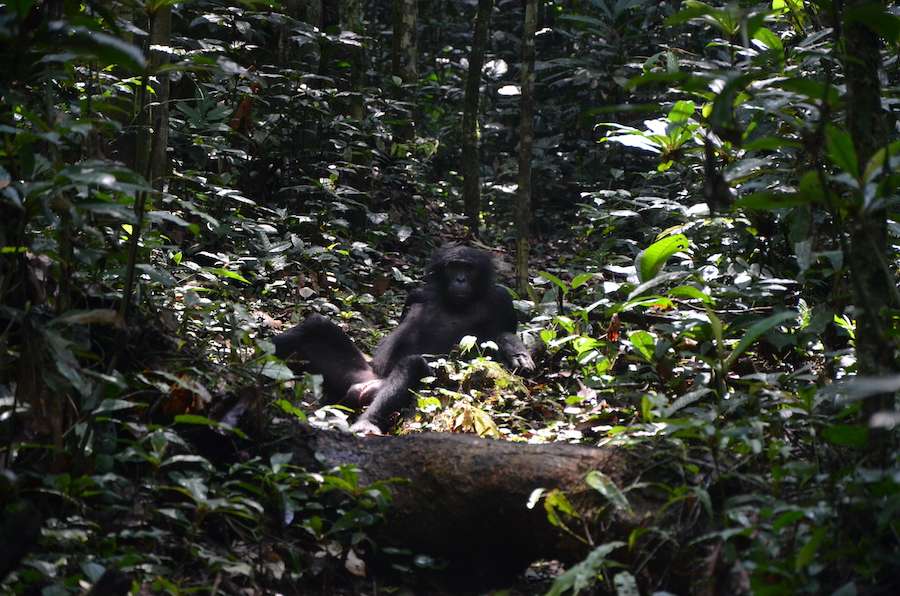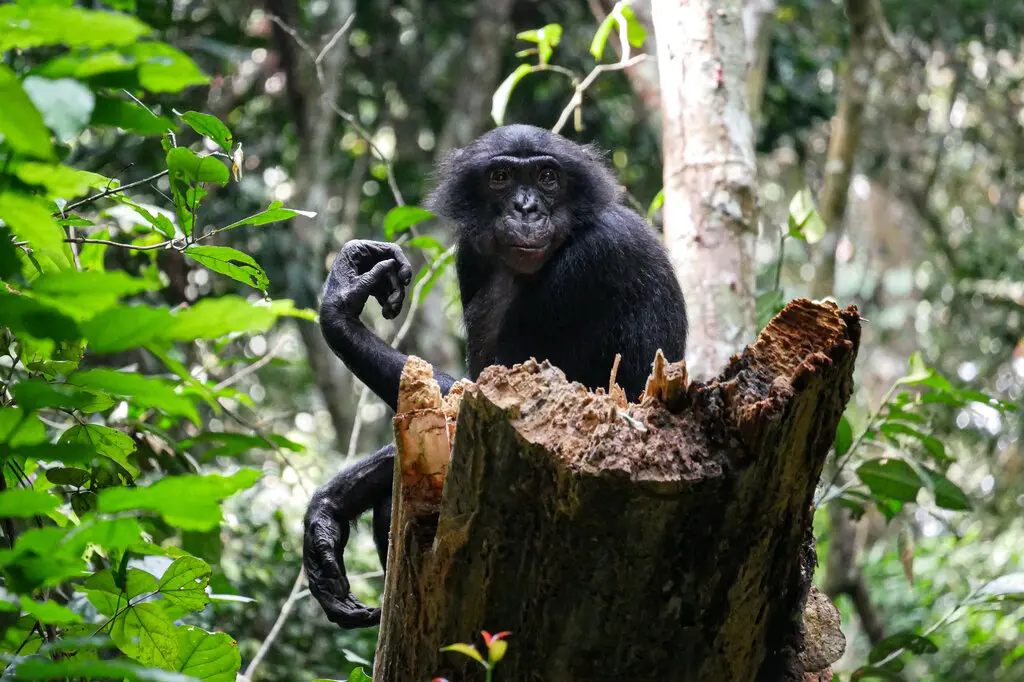Beyond Hippie Apes: A New Look at Bonobo Aggression

For years, bonobos, our close ape relatives, have enjoyed a reputation as the peace-loving “hippy apes” compared to their more aggressive chimpanzee cousins. However, a recent study published in Current Biology challenges this simplistic view. Led by anthropologist Maud Mouginot, the research sheds light on a more complex reality: bonobos do exhibit aggression, just in a way distinct from chimpanzees.
Witnessing Aggression in the Heart of the Congo
Mouginot’s journey began in the dimly lit Kokolopori Bonobo Reserve, deep within the Democratic Republic of Congo (DRC). Here, amidst the lush rainforest, she and her colleagues were tracking one of the three resident bonobo groups. Their tranquil morning was abruptly shattered by a cacophony of shrieks. One bonobo was viciously chasing another, a display of raw aggression that shattered the image of peaceful coexistence.
“You can feel the violence,” Mouginot recalls. “One is really unhappy, it’s screaming, it’s crying, it’s so scared and the other one’s rushing [toward it].”
Rethinking Bonobo Behavior: Aggression Unmasked
This encounter, along with thousands of hours of observations, led Mouginot and her team to a groundbreaking conclusion. Bonobos, classified as an endangered species confined solely to the DRC, do indeed exhibit aggression. However, their approach differs dramatically from chimpanzees.
The researchers meticulously compared male aggression between bonobos and chimpanzees. They followed three bonobo groups in Kokolopori and two chimpanzee communities in Tanzania’s Gombe National Park. Their analysis revealed a surprising truth: aggressive encounters, though not lethal, were nearly three times more common among bonobos. These included acts like hitting, biting, pulling, and chasing.
Furthermore, the study found a correlation between aggression and mating success in bonobos. Males displaying aggression secured more opportunities to mate with females.
Challenging Established Theories: Beyond Self-Domestication
These findings cast doubt on a long-held theory known as the self-domestication hypothesis. This concept proposes that both bonobos and humans evolved a more cooperative and friendly nature, leading to increased survival and reproductive success. Mouginot suggests that aggression might be influenced by factors beyond this theory.

“The study doesn’t really support the self-domestication hypothesis,” says Mouginot. “This suggests that aggression might depend on other factors we haven’t fully explored yet.”
Strategies for Survival: A Tale of Two Apes
The research also highlights contrasting social strategies between the two ape species. Unlike chimpanzees, who form male coalitions to attack rivals, bonobos appear to favor individualistic tactics for survival. This might be linked to their habit of following female groups throughout the forest.
A previous study by Mouginot’s co-author, Martin Surbeck, revealed that aggressive bonobo males tend to affiliate more with females. This strategy could be interpreted as a form of social bonding, perhaps similar to human friendships.
“Bonobos are far more complex than we thought before,” Mouginot concludes. “They utilize a wider range of strategies compared to chimpanzees.”
Beyond Behavior: The Looming Threat of Extinction
While understanding bonobo behavior is crucial, Sally Coxe, president of the Bonobo Conservation Initiative, emphasizes the urgency of addressing the bigger picture: their dwindling population.
“This is a fascinating study, and further comparative research between bonobos and chimps is vital,” says Coxe. However, she cautions against misconstruing the findings. “Bonobo aggression is very different from the premeditated, often lethal raids launched by chimpanzee war parties.” Coxe, a seasoned bonobo conservationist with decades of experience, highlights the peaceful nature of these apes – unlike other apes, bonobos are not known to kill each other.
Despite the valuable insights gained, Mouginot acknowledges the risk of overlooking the most pressing issue: bonobo survival. Their historical range spanned over 500,000 square kilometers, but deforestation and hunting have confined them to fragmented pockets of forest in the western and central DRC. Reliable population estimates are challenging due to their habitat, but experts suggest only around 15,000 bonobos remain in the wild.
Hunting for bushmeat poses a significant threat, as females typically breed only once every five years. Habitat loss due to shifting agriculture further compounds the problem. Each time Mouginot returns to places like Kokolopori, she witnesses more forest converted into farmland.
“We often get engrossed in studying their behavior and forget that they might disappear one day,” warns Mouginot. “It could happen sooner than we think.”
A Beacon of Hope: Community-Based Conservation
Coxe’s organization works with local communities throughout the bonobos’ range. She believes these apes can be saved, but swift action is needed. Empowering local communities who practice traditional methods
For years, bonobos, our close ape relatives, have enjoyed a reputation as the peace-loving “hippy apes” compared to their more aggressive chimpanzee cousins. However, a recent study published in Current Biology challenges this simplistic view. Led by anthropologist Maud Mouginot, the research sheds light on a more complex reality: bonobos do exhibit aggression, just in a way distinct from chimpanzees.
Witnessing Aggression in the Heart of the Congo
Mouginot’s journey began in the dimly lit Kokolopori Bonobo Reserve, deep within the Democratic Republic of Congo (DRC). Here, amidst the lush rainforest, she and her colleagues were tracking one of the three resident bonobo groups. Their tranquil morning was abruptly shattered by a cacophony of shrieks. One bonobo was viciously chasing another, a display of raw aggression that shattered the image of peaceful coexistence.
“You can feel the violence,” Mouginot recalls. “One is really unhappy, it’s screaming, it’s crying, it’s so scared and the other one’s rushing [toward it].”
Rethinking Bonobo Behavior: Aggression Unmasked
This encounter, along with thousands of hours of observations, led Mouginot and her team to a groundbreaking conclusion. Bonobos, classified as an endangered species confined solely to the DRC, do indeed exhibit aggression. However, their approach differs dramatically from chimpanzees.
The researchers meticulously compared male aggression between bonobos and chimpanzees. They followed three bonobo groups in Kokolopori and two chimpanzee communities in Tanzania’s Gombe National Park. Their analysis revealed a surprising truth: aggressive encounters, though not lethal, were nearly three times more common among bonobos. These included acts like hitting, biting, pulling, and chasing.
Furthermore, the study found a correlation between aggression and mating success in bonobos. Males displaying aggression secured more opportunities to mate with females.
Challenging Established Theories: Beyond Self-Domestication
These findings cast doubt on a long-held theory known as the self-domestication hypothesis. This concept proposes that both bonobos and humans evolved a more cooperative and friendly nature, leading to increased survival and reproductive success. Mouginot suggests that aggression might be influenced by factors beyond this theory.
“The study doesn’t really support the self-domestication hypothesis,” says Mouginot. “This suggests that aggression might depend on other factors we haven’t fully explored yet.”
Strategies for Survival: A Tale of Two Apes
The research also highlights contrasting social strategies between the two ape species. Unlike chimpanzees, who form male coalitions to attack rivals, bonobos appear to favor individualistic tactics for survival. This might be linked to their habit of following female groups throughout the forest.
A previous study by Mouginot’s co-author, Martin Surbeck, revealed that aggressive bonobo males tend to affiliate more with females. This strategy could be interpreted as a form of social bonding, perhaps similar to human friendships.
“Bonobos are far more complex than we thought before,” Mouginot concludes. “They utilize a wider range of strategies compared to chimpanzees.”
Beyond Behavior: The Looming Threat of Extinction
While understanding bonobo behavior is crucial, Sally Coxe, president of the Bonobo Conservation Initiative, emphasizes the urgency of addressing the bigger picture: their dwindling population.
“This is a fascinating study, and further comparative research between bonobos and chimps is vital,” says Coxe. However, she cautions against misconstruing the findings. “Bonobo aggression is very different from the premeditated, often lethal raids launched by chimpanzee war parties.” Coxe, a seasoned bonobo conservationist with decades of experience, highlights the peaceful nature of these apes – unlike other apes, bonobos are not known to kill each other.
Despite the valuable insights gained, Mouginot acknowledges the risk of overlooking the most pressing issue: bonobo survival. Their historical range spanned over 500,000 square kilometers, but deforestation and hunting have confined them to fragmented pockets of forest in the western and central DRC. Reliable population estimates are challenging due to their habitat, but experts suggest only around 15,000 bonobos remain in the wild.
Hunting for bushmeat poses a significant threat, as females typically breed only once every five years. Habitat loss due to shifting agriculture further compounds the problem. Each time Mouginot returns to places like Kokolopori, she witnesses more forest converted into farmland.
“We often get engrossed in studying their behavior and forget that they might disappear one day,” warns Mouginot. “It could happen sooner than we think.”
A Beacon of Hope: Community-Based Conservation
Coxe’s organization works with local communities throughout the bonobos’ range. She believes these apes can be saved, but swift action is needed. Empowering local communities who practice traditional methods
Related Topics:
- Dignity in Demand: Pioneering a Sustainable Economy for People and Planet – Micro2media
- Navigating Uncertainty: Revisiting the Role of Probabilities in Climate Adaptation Policy – Micro2media
- https://www.science.org/content/article/bonobos-hippie-chimps-might-not-be-so-mellow-after-all
- https://www.newscientist.com/article/2426678-peaceful-male-bonobos-may-actually-be-more-aggressive-than-chimps/